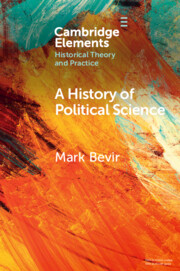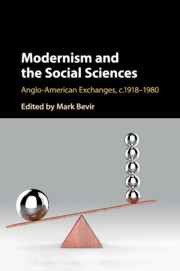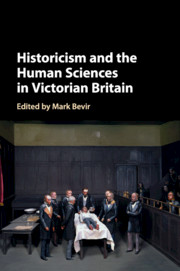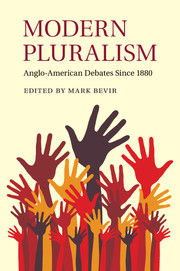57 results

A History of Political Science
-
- Published online:
- 04 August 2022
- Print publication:
- 11 August 2022
-
- Element
- Export citation
Copyright page
-
- Book:
- Modernism and the Social Sciences
- Published online:
- 21 September 2017
- Print publication:
- 28 September 2017, pp iv-iv
-
- Chapter
- Export citation
Contents
-
- Book:
- Modernism and the Social Sciences
- Published online:
- 21 September 2017
- Print publication:
- 28 September 2017, pp v-v
-
- Chapter
- Export citation
1 - Modernism and the Social Sciences
-
-
- Book:
- Modernism and the Social Sciences
- Published online:
- 21 September 2017
- Print publication:
- 28 September 2017, pp 1-16
-
- Chapter
- Export citation
6 - International Relations
-
-
- Book:
- Modernism and the Social Sciences
- Published online:
- 21 September 2017
- Print publication:
- 28 September 2017, pp 130-154
-
- Chapter
- Export citation
Contributors
-
- Book:
- Modernism and the Social Sciences
- Published online:
- 21 September 2017
- Print publication:
- 28 September 2017, pp vi-vi
-
- Chapter
- Export citation
Index
-
- Book:
- Modernism and the Social Sciences
- Published online:
- 21 September 2017
- Print publication:
- 28 September 2017, pp 257-268
-
- Chapter
- Export citation

Modernism and the Social Sciences
- Anglo-American Exchanges, c.1918–1980
-
- Published online:
- 21 September 2017
- Print publication:
- 28 September 2017
Index
-
- Book:
- Historicism and the Human Sciences in Victorian Britain
- Published online:
- 20 April 2017
- Print publication:
- 10 March 2017, pp 262-274
-
- Chapter
- Export citation
Copyright page
-
- Book:
- Historicism and the Human Sciences in Victorian Britain
- Published online:
- 20 April 2017
- Print publication:
- 10 March 2017, pp iv-iv
-
- Chapter
- Export citation
List of Contributors
-
- Book:
- Historicism and the Human Sciences in Victorian Britain
- Published online:
- 20 April 2017
- Print publication:
- 10 March 2017, pp vi-vi
-
- Chapter
- Export citation
1 - Historicism and the Human Sciences in Victorian Britain
-
-
- Book:
- Historicism and the Human Sciences in Victorian Britain
- Published online:
- 20 April 2017
- Print publication:
- 10 March 2017, pp 1-20
-
- Chapter
- Export citation

Historicism and the Human Sciences in Victorian Britain
-
- Published online:
- 20 April 2017
- Print publication:
- 10 March 2017
Contents
-
- Book:
- Historicism and the Human Sciences in Victorian Britain
- Published online:
- 20 April 2017
- Print publication:
- 10 March 2017, pp v-v
-
- Chapter
- Export citation
Contributors
-
-
- Book:
- Modern Pluralism
- Published online:
- 05 May 2012
- Print publication:
- 19 April 2012, pp vii-vii
-
- Chapter
- Export citation
Contents
-
- Book:
- Modern Pluralism
- Published online:
- 05 May 2012
- Print publication:
- 19 April 2012, pp v-vi
-
- Chapter
- Export citation
Modern Pluralism - Half title page
-
- Book:
- Modern Pluralism
- Published online:
- 05 May 2012
- Print publication:
- 19 April 2012, pp i-ii
-
- Chapter
- Export citation

Modern Pluralism
- Anglo-American Debates since 1880
-
- Published online:
- 05 May 2012
- Print publication:
- 19 April 2012
Modern Pluralism Anglo-American Debates Since 1880 - Title page
-
-
- Book:
- Modern Pluralism
- Published online:
- 05 May 2012
- Print publication:
- 19 April 2012, pp iii-iii
-
- Chapter
- Export citation
9 - The revival of radical pluralism:
-
-
- Book:
- Modern Pluralism
- Published online:
- 05 May 2012
- Print publication:
- 19 April 2012, pp 179-213
-
- Chapter
- Export citation

